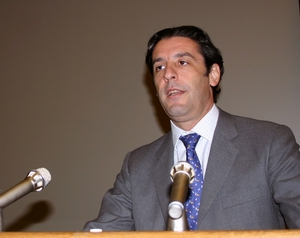Industrial Development Board, twenty-ninth session
Statement by UNIDO Director General
The Director-General's statement (view or download opening statement) to IDB29 (see also DG's IDB29 closing statement) outlined his proposals for the long-term vision for the Organization that he was invited to prepare by the 10th session of UNIDO's General Conference in December 2003. He began by presenting an update of the current situation at UNIDO, detailing the results of the reform and transformation process. After outlining his proposals for UNIDO's long term vision, (contained in a paper presented to the Board) he presented a programme for finalizing the vision in close consultation with the member states and other stakeholders (view or download programme) for its adoption by the 11th session of the General Conference in December 2005.
In drawing IDB29's attention to the main features of his proposal, the Director-General expressed his belief that the process of professionalization and specialization, or re-specialization as he has called it, should be continued. "For this purpose, I propose that UNIDO should, in future, focus its technical cooperation and global forum activities in four areas: Private sector development, trade capacity building, energy and environment, and post-crisis industrial rehabilitation and reconstruction."
"The emphasis on private sector development, especially with regard to small and medium enterprises, stems from the fact that the private sector is the main engine of economic growth, which is essential for poverty alleviation, the most important MDG. Therefore a clear focus on assisting the development of the domestic private sector in developing countries and transition economies will be the strategic contribution of UNIDO to the achievement of this MDG. This must be a continuing theme of the UNIDO technical assistance activities during the next 10-15 years. It is in view of this that I have signed a Cooperation Agreement with the Administrator of UNDP in September 2004 for the development and implementation of a joint programme between our two organizations in this area."
After giving an overview of the remaining three areas of focus in his proposals, the Director-General said that in addition to focusing services in these four areas, efforts to "redress the imbalance in our service delivery between activities related to multilateral environmental agreements and our other core competencies" must continue. In his statements to the last sessions of the General Conference and IDB, the Director-General pointed out that only about 30 per cent of UNIDO's technical cooperation delivery is accounted for by its core competencies, such as industrial governance and statistics, investment and technology promotion, quality and productivity, small business development, agro-industries, and cleaner production centres, with the remainder being accounted for by services related to the implementation of multilateral environmental protocols and industrial support institutions, such as ITPOs and ITCs.
Another important issue in the Director-General's proposals is for UNIDO to continue "a strong process of decentralization of its activities to the field in a more effective manner, and to build up a corresponding field network that provides us more value for money." The Director-General signed a Cooperation Agreement (see UNIDOScope 3 - 9 October 2004) with the Administrator of UNDP on 23 September 2004, which in the long term would extend UNIDO presence up to 80 countries from the current level of representation in about 30 countries.
"Finally, and critically," said the Director-General, "I am convinced that the future gains in UNIDO's efficiency, which we intend to achieve in the coming years, will only be possible in the context of system-wide efficiency gains in the UN development framework. I have therefore formulated a proposal for an improved voluntary coordination mechanism between the various development-oriented agencies, programmes and funds of the UN system, which I have discussed already with the UN Secretary-General and other executive heads of UN agencies including the World Bank, the IMF and WTO on a number of occasions, the last being in the meeting of the UN System Chief Executives Board (CEB) for Coordination held in New York on 29-30 October 2004 (view of download proposal to CEB). I also presented an outline of my proposal at the 28th session of the IDB held in May this year. I strongly feel that improved coordination of the development efforts of the UN system is an indispensable prerequisite for raising the efficiency and effectiveness of our service delivery in the years to come."
After the opening statement of the UNIDO Director-General Carlos Magariños, statements were made by the delegates from Burkina Faso, Croatia, Morocco, Argentina, Kenya and Nigeria.
